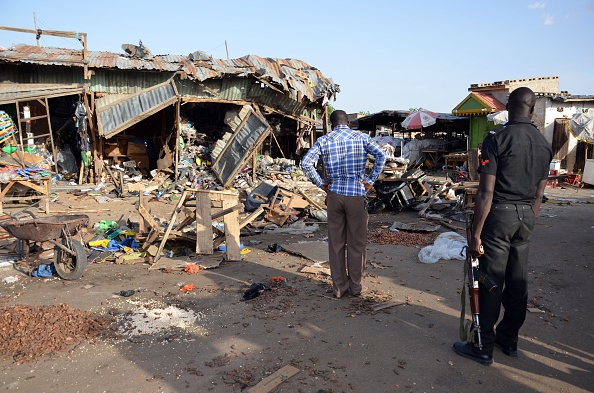
AFP PHOTO/STRINGER/Getty Images (Photo credit should read STRINGER/AFP/Getty Images)
On January 17, two suicide bombers targeted a gathering of civilians in Muna Garage area inside the city of Maiduguri in the northeastern state of Borno.
Officials from the Nigerian State Emergency Management Agency (SEMA) revealed that 12 civilians were killed and 48 others were injured in the attack, according to Reuters.
Later Nigerian sources said that the attack was conducted by four female suicide bombers, not only two as Reuters reported and claimed that the ISIS-affiliated militant group Boko Haram carried the attack. However, the terrorist group has not yet confirmed that it was behind the deadly attack.
Over the last few weeks, the Nigerian Army has conducted a series of military operations in Borno state to counter the threat of Boko Haram there. However, it appears that the operations didn’t affect the group’s capabilities to conduct terrorist attacks against civilians in the state.
In a related development, the Nigerian Air Force (NAF) revealed in an official statement that one of its “remotely piloted aircraft” (RPA) destroyed a vehicle workshop of Boko Haram in Sambisa Forest of Borno state on January 15. The NAF said that several vehicles and fighters of the terrorist group were neutralized in the RPA airstrike.
“The subsequent air strike by the NAF RPA resulted in the immediate destruction of the vehicles in the targeted location, killing all the BHTs inside it, as no survivors were seen scampering from the location after impact,” the NAF said in the statement.
The airstrike was likely conducted by a Chinese-made CH-3 UCAV. Five of these light UCAVs were purchased by the NAF back in 2014 in order to boost its aerial attack capabilities to face the growing threat of Boko Haram.
The NAF also revealed that it used an an unspecified surveillance and reconnaissance platform to discover Boko Haram workshop. The platform was likely one of the King Air 350 aircraft that was purchased by the NAF from the US in 2014.



